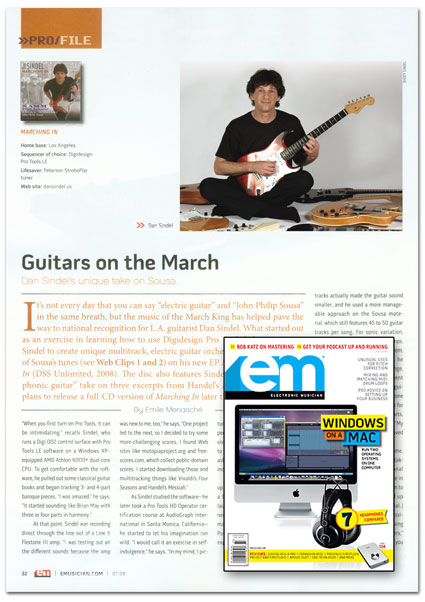Dan Sindel featured in Electronic Musician – July 2008
For Press Release: 06/26/08
 Yet another exciting day as Dan Sindel’s Symphonic Guitars earn a full page Pro-File in the media giant “Electronic Musician” magazines July 2008 issue.
Yet another exciting day as Dan Sindel’s Symphonic Guitars earn a full page Pro-File in the media giant “Electronic Musician” magazines July 2008 issue.
The article covers quite alot of ground as writer Emile Menasché eloquently summed up Dan’s “Symphonic Guitar” approach to multi tracking layer upon layer of guitar tracks to create a huge wall of sound and also talks about his debut release of “Marching In: A Tribute to the March King John Philip Sousa”.
Dan states: “I have been reading Electronic Musician Magazine for a very long time and it is an absolute honor and a privilege to have been featured within EM’s revered pages, it truly is a thrill and I certainly hope to inspire many a guitar player to try their hand at raising the bar regarding their methods of recording”.
Pro/File: Guitars on the March
By Emile Menasche
DAN SINDEL’S UNIQUE TAKE ON SOUSA
It’s not every day that you can say “electric guitar” and “John Philip Sousa” in the same breath, but the music of the March King has helped pave the way to national recognition for L.A. guitarist Dan Sindel. What started out as an exercise in learning how to use Digidesign Pro Tools led Sindel to create unique multitrack, electric guitar orchestrations of Sousa’s tunes (see Web Clips 1 and 2) on his new EP Marching In (DSS Unlimited, 2008). The disc also features Sindel’s “symphonic guitar” take on three excerpts from Handel’s Messiah. The guitarist plans to release a full-CD version of Marching In later this year.
 “When you first turn on Pro Tools, it can be intimidating,” recalls Sindel, who runs a Digi 002 control surface with Pro Tools LE software on a Windows XP-equipped AMD Athlon 6000+ dual-core CPU. To get comfortable with the software, he pulled out some classical guitar books and began tracking 3- and 4-part baroque pieces. “I was amazed,” he says. “It started sounding like Brian May with three or four parts in harmony.”
“When you first turn on Pro Tools, it can be intimidating,” recalls Sindel, who runs a Digi 002 control surface with Pro Tools LE software on a Windows XP-equipped AMD Athlon 6000+ dual-core CPU. To get comfortable with the software, he pulled out some classical guitar books and began tracking 3- and 4-part baroque pieces. “I was amazed,” he says. “It started sounding like Brian May with three or four parts in harmony.”
At that point, Sindel was recording direct through the line out of a Line 6 Flextone III amp. “I was testing out all the different sounds because the amp was new to me, too,” he says. “One project led to the next, so I decided to try some more-challenging scores. I found Web sites like mutopiaproject.org and free-scores.com, which collect public-domain scores. I started downloading those and multitracking things like Vivaldi’s Four Seasons and Handel’s Messiah.”
As Sindel studied the software — he later took a Pro Tools HD Operator certification course at AudioGraph International in Santa Monica, California — he started to let his imagination run wild. “I would call it an exercise in self-indulgence,” he says. “In my mind, I pictured an orchestra where you have six people sitting in the first violin chair, six in the second, and so on to build up to a 60- or 100-piece orchestra, so I asked myself, ‘Do I need to record each individual part?’”
At first, he did just that. “I ended up with 500 individual guitar parts in a 15-minute mini epic!” he says with a laugh. “I dumped 500 tracks on engineer Phil Moore and asked if he could make music out of it. He deserves the Purple Heart! It was a big learning experience for me.”
Sindel soon realized that too many tracks actually made the guitar sound smaller, and he used a more manageable approach on the Sousa material, which still features 45 to 50 guitar tracks per song. For sonic variation, Sindel calls on an array of guitars, amps, and preamps — sometimes miking them, sometimes going direct. The key, he says, is to understand the pitch range, tone, and attack of each instrument you’re trying to emulate with the guitar; for example, using a mellower tone and a more legato, sliding approach for trombone parts than for trumpet parts. “Tuning is also important,” he says. “My Peterson StroboFlip [tuner] really saved me because it’s so accurate.”
Although he records at home, Sindel emphasizes the benefit of taking the tracks out to professional engineers and producers. (An article in EM’s August 2007 issue inspired him to contact Carmen Rizzo, who ended up mixing some of the Sousa material.) “I did the best preproduction I possibly could, knowing I would be passing the torch to professional engineers,” he says. “There comes a time when you can’t do it all yourself.”
MARCHING IN
- Home base: Los Angeles
- Sequencer of choice: Digidesign Pro Tools LE
- Lifesaver: Peterson StroboFlip tuner
